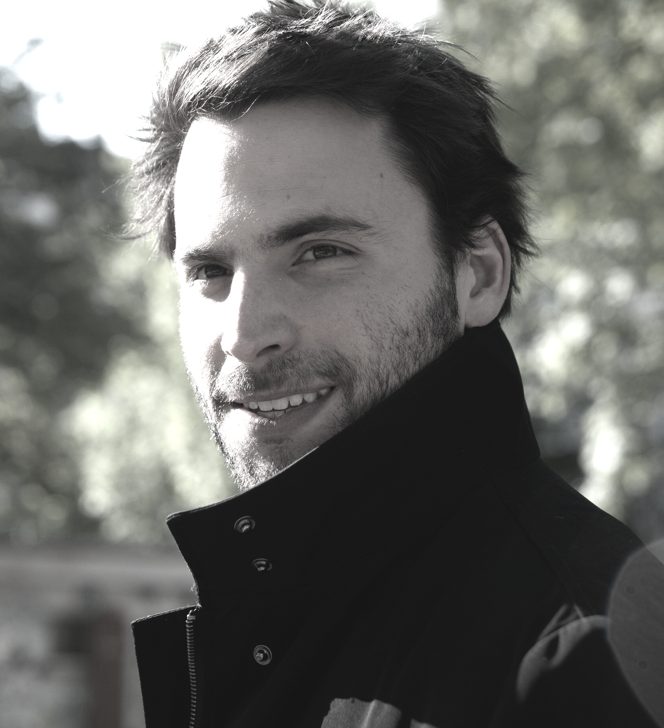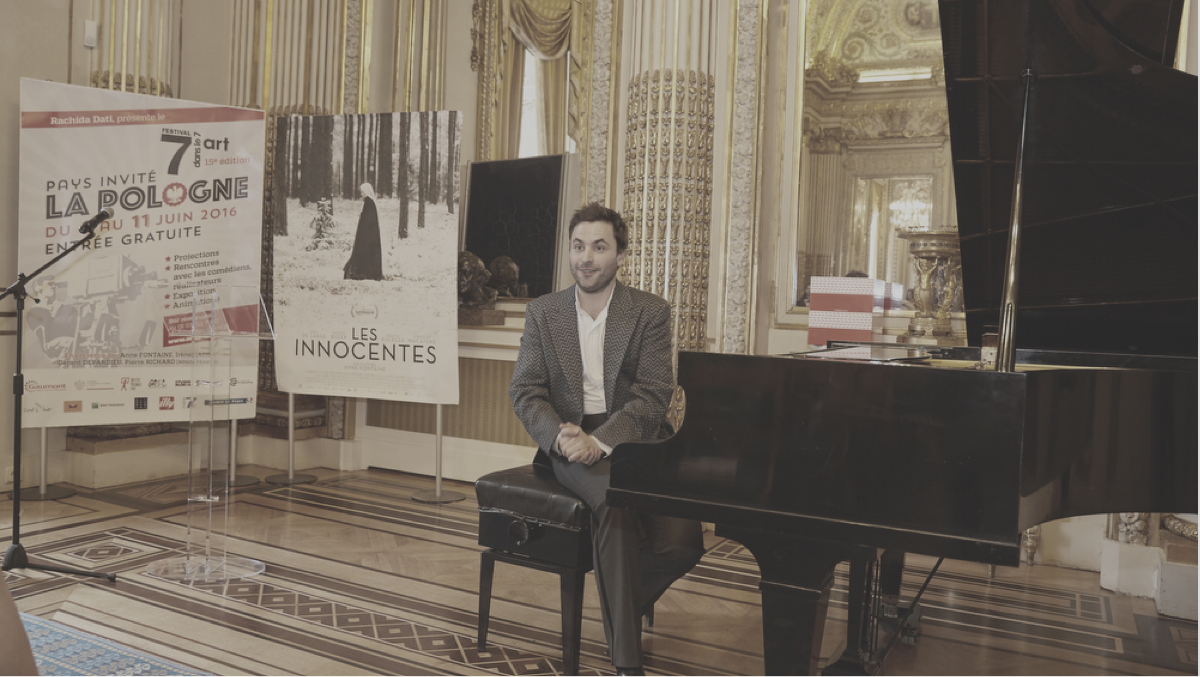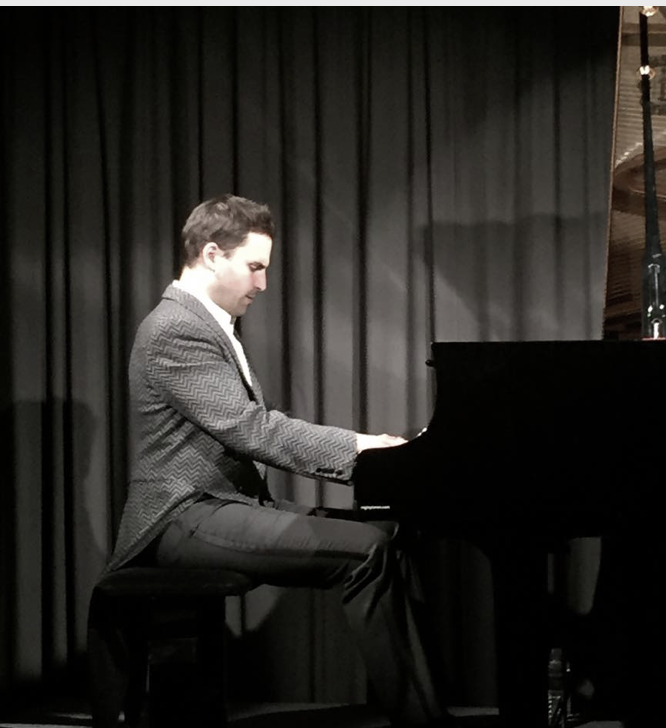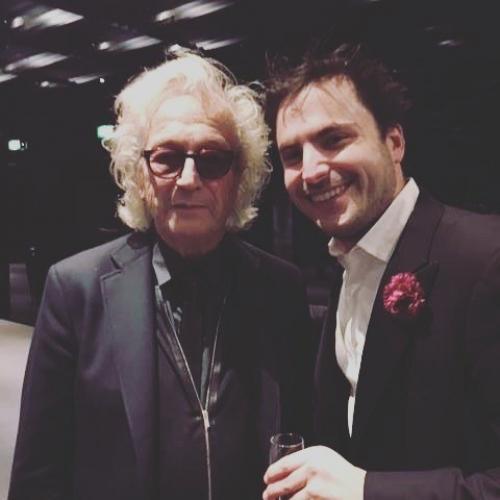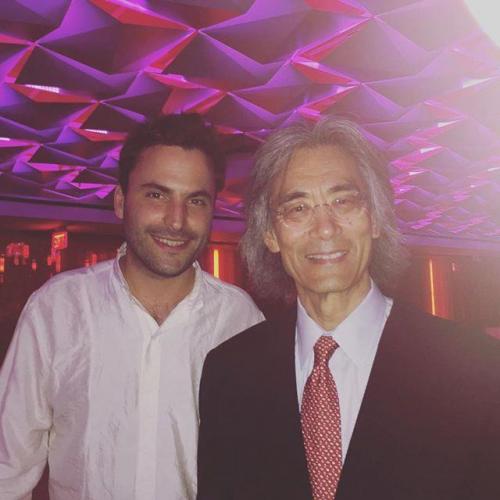« The turbulent life of the pianist and composer André Mathieu (1929–68) began in triumph and ended in tragedy. This son of professional musicians was hailed as “the Mozart of Québec” at his Parisian debut in 1936 but ultimately faded into in a haze of alcoholism and obscurity, succumbing to a heart attack at the age of 39. It is perhaps not surprising that Mathieu’s resolutely post-Romantic style, heavily influenced by Scriabin and Debussy and profoundly melodic and episodic by nature, was disdained in the new music circles of the 1960s. It is largely due to the advocacy of the Québécois pianist-composer Alain Lefèvre, a champion of Mathieu’s piano concertos, that his reputation has been restored in our post-modern era.
The album features Mathieu’s eight chamber works from the middle of the 20th century, the era of his finest compositions. It includes a selection of compact duets for violin and piano featuring pianist Jean-Philippe Sylvestre with violinists Mark Djokic and Andréa Tyniec alternating as soloists. Tyniec (who dazzled Toronto recently performing Ana Sokolović’s violin concerto for New Music Concerts) lays claim to the enjoyable though discursive Violin Sonata. Of particular interest are the Quintette for piano and string quartet and the Trio for violin, cello and piano, two substantial works in which Mathieu exceeds himself in the mastery of large-scale forms. The performances are uniformly excellent and production values are top notch. »
Daniel Foley, Atma classique, August 28, 2019
« Dix ans après sa création, c’est à Saint-Constant que Jean-Philippe Sylvestre avec l’Orchestre Métropolitain et Alain Trudel reprennent l’œuvre dans la version de Gilles Bellemare à quelques pas de la maison du docteur Joseph-Arthur Gagnon, grand-père d’André Mathieu, où son petit-fils passait ses vacances.
Le jeu entier, clair et puissant aussi de Jean-Philippe Sylvestre rend justice à une œuvre à la fois foisonnante et très construite.
Le pianiste Jean-Philippe Sylvestre s’engage avec un zèle idéal dans la défense et le rayonnement des œuvres de Mathieu ; tout coule de source et avec un naturel manifeste sous ses doigts, qu’il s’agisse des élans parfois angoissés du concerto n˚4, ou de l’éblouissante confession nostalgique que constitue la Rhapsodie de Rachmaninov.
Le jeu sinueux très sensuel et brillant du clavier danse avec l’orchestre dans l’énoncé superposé au motif de Paganini, du thème de Dies irae (fa-mi fa-ré-mi-do ré-ré) dans la 6ème variation puis dans la 10ème. L’énergie de feu se déploie grâce au pianiste qui sait articuler en maints endroits, son approche très directe et aussi ciselée, mêlant avec finesse et lyrisme, détails et puissance, le génie mélodique de Rachma, à son panache étourdissant ; telle approche emporte toute la rhapsodie dans un bain organiquement continu, chaque séquence/variation se succèdent à l’autre avec une évidente souplesse là encore.
Jean-Philippe Sylvestre sait déployer une séduction manifeste tout en soignant les éclats intérieurs. Le pianiste n’en oublie pas pour autant l’humeur fantasque, l’idée du caprice et de la libre fantaisie liés au genre rhapsodique… ainsi cette conclusion imprévisible qui s’efface, fugitivement, dans une ultime mesure jouée au piano. La liberté et la force évocatrice du jeu pianistique sont très convaincants. »
Hugo Papbst, Classiquenews.com, December 4, 2018
« I seek to do justice to the composer, to be as close to what he plays as possible, while finding a balance between the recordings [of André Mathieu] and the orchestra. The connection with the orchestra is very important,” explains Jean-Philippe Sylvestre. An oeuvre so rarely played or recorded inevitably raises the question of its interpretation. Sylvestre chose to remain true to the composer’s mind by relying upon Mathieu’s recordings and his main influences, Rachmaninoff for the most part and Gershwin bringing touches of jazz. Like Mathieu, Sylvestre is a remarkable improviser; he manages to vividly bring out the improvised aspect essential to Mathieu’s mind, noticeable in the style, detached and ever-changing, as much as the voluntarily destructured form of his musical phrases. Further, Sylvestre opts for a sincere and linear sound, stripped of rubato, drawing its expression from a wide array of dynamics, by tapping into a well-proven musical technique and adding just a dab of madness that seems to echo Mathieu’s tumultuous life. »
BENJAMIN GORON, Ma Scena, July 14, 2018
« The ATMA release offered a fresh perspective on the composer… To experience it live was exhilarating. Let’s simplify using our existing benchmarks: by removing a bit of Rachmaninoff and adding touches of Gershwin, Sylvestre manages to create a soundscape with the music of a young (14 years old) Mathieu. Jean-Philippe Sylvestre and Alain Trudel’s interpretation of the ‘Quebec Concerto’ is bold, dynamic, spontaneous, and fuelled by a true and beautiful complicity with the musicians of the Orchestre Métropolitain. »
CHRISTOPHE HUSS, Le Devoir, June 14, 2018
« Jean-Philippe Sylvestre very well may have gotten into Mathieu’s work before Alain Lefèvre, as he was but a 13-year-old pianist, in 1993, when Jean-Claude Labrecque asked him to participate in his documentary André Mathieu, Musician. For Sylvestre, it was love at first sound, as it were: ‘I became enamoured with André Mathieu and his art all over again when I heard him play. Georges Nicholson had lent me recordings. You can spot a genius a mile away.’ ‘Mathieu plays around with metrics a lot, and rhythmic shifts, which creates a unique style that is very much his own, some sort of destructured phrase.’ Sylvestre tries to capture Mathieu’s ‘exciting vibration’ and summarizes: ‘A pianist has his personal touch, but I want to respect the composer as much as possible, and thus respect this distinctive vibration. And for the audience to receive the message of the rhythm shifts, the tempo must be relatively fast. »
CHRISTOPHE HUSS, Le Devoir, June 9, 2018
« His Islamey by Balakirev is stunning: it has precise rhythm, full sounds, even in the wildest cascades of notes, velocity, a singing tone, clarity in each characteristic, all of this in the piece that was generally considered to be the most difficult in piano repertoire until Ravel wrote Scarbo. Not just anyone can do that. The technical skills of this pianist are simply fabulous, and everything is delivered without gesticulation, without making faces, without showing emotion, and with hair neatly in place.
We can observe the same absolute mastery in the Concerto de Québec by André Mathieu, arranged for solo piano by Jean-Philippe Sylvestre himself. Mathieu’s extremely drawn out and romantic composition style, which most Belgian listeners are hearing for the first time, is rendered with assurance at all times. With irresistible energy, swells of emotion, and constant expressiveness, Mathieu’s music has never before sounded so close to that of his mentor, Rachmaninoff. »
Dominique Joucken, La Presse, January 19, 2018
« The juxtaposition of these two new recordings creates one of the most stimulating aesthetic musical reflections of the year, and the man responsible is named Jean-Philippe Sylvestre. It’s an understatement to say that Sylvestre is doing more than achieving the wildest dreams of Alain Lefèvre. Not only is he taking up the mantle, but also, with the Concerto de Québec, he offers a radically new vision that is the diametric opposite of the original. »
Christophe Huss, La Presse, September 9, 2017
« ...make way for the brilliant pianist Jean-Philippe Sylvestre. Under the direction of conductor Alain Trudel and with the Orchestre Métropolitain, he delivers a striking, romantic version of the famous Concerto de Québec. With a palpable, very cinematic intensity, he demonstrates finesse and transparency. It is truly a great performance. »
Christophe Rodriguez , Journal de Montréal, September 10, 2017
« The light and generous piano of Jean-Philippe Sylvestre »
Frédéric Lambert, Ici Radio-Canada, August 25, 2017
« After saying a few words about the pieces, Nézet-Séguin invited Jean-Philippe Sylvestre to play Rachmaninoff’s Rhapsody on a Theme of Paganini. In a bright red shirt, the young pianist went through the 24 variations with dazzling technique, with hands going seamlessly from powerful to caressing, and with a real imagination. (...) As an encore, he gave the audience a little jazz number with a few of the musicians from the orchestra. »
Claude Gingras, La Presse, July 8, 2011
« The clarity of Sylvestre’s playing brought out structure and counterpoint; his sometimes-extreme dynamics evoked the original instruments and orchestral dialogs. »
Claude Gingras, La Presse, October 1, 2008
« Without at doubt, we are dealing with a real pianist here. At not even twenty years old, Sylvestre already possesses a complete skill set and a powerful style, expression, and sound. What’s more, his musicality, natural and generous phrasing as well as his imagination make for a refreshing listening experience of the great Tchaikovsky. »
Claude Gingras, La Presse, December 4, 2000
